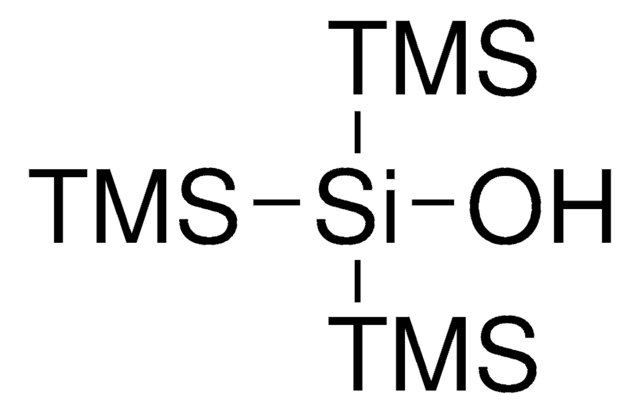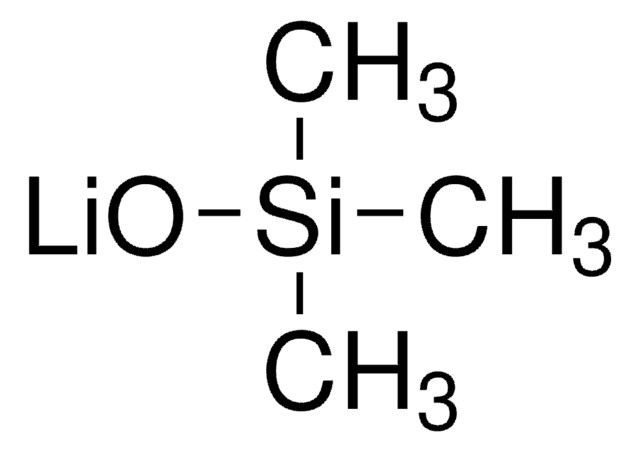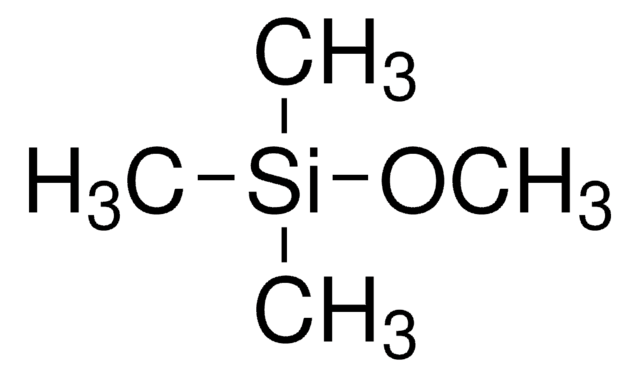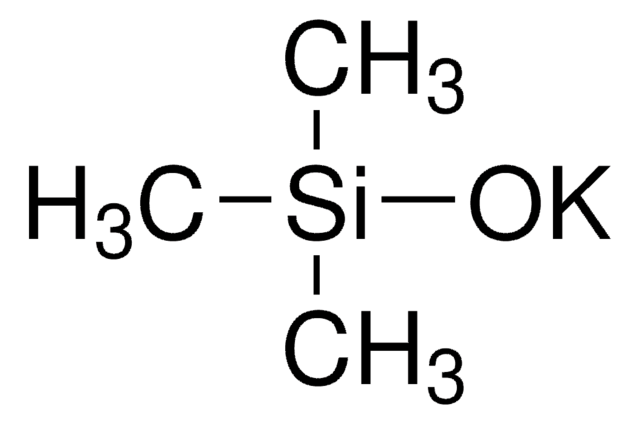725986
Trimethylsilanol
≥97.5% (GC)
Synonym(s):
TMS, TMSiOH, Hydroxytrimethylsilane
Sign Into View Organizational & Contract Pricing
All Photos(1)
About This Item
Linear Formula:
(CH3)3SiOH
CAS Number:
Molecular Weight:
90.20
Beilstein:
1361356
EC Number:
MDL number:
UNSPSC Code:
12352103
PubChem Substance ID:
NACRES:
NA.22
Recommended Products
Quality Level
Assay
≥97.5% (GC)
form
liquid
SMILES string
C[Si](C)(C)O
InChI
1S/C3H10OSi/c1-5(2,3)4/h4H,1-3H3
InChI key
AAPLIUHOKVUFCC-UHFFFAOYSA-N
Looking for similar products? Visit Product Comparison Guide
Application
Trimethylsilanol (TMS) can be used to prepare tris(trimethylsiloxy) aluminum (I) by reacting with triethylaluminum.
Signal Word
Danger
Hazard Statements
Precautionary Statements
Hazard Classifications
Acute Tox. 4 Inhalation - Aquatic Chronic 3 - Flam. Liq. 2
Storage Class Code
3 - Flammable liquids
WGK
WGK 1
Flash Point(F)
44.6 °F - closed cup
Flash Point(C)
7 °C - closed cup
Choose from one of the most recent versions:
Already Own This Product?
Find documentation for the products that you have recently purchased in the Document Library.
Customers Also Viewed
Reactions of Aldehyde Caused by Tris (trimethylsiloxy) aluminum.
Saegusa T, et al.
Bulletin of the Chemical Society of Japan, 40(8), 1960-1964 (1967)
Joan Malmstrøm
Journal of pharmaceutical sciences, 108(4), 1512-1520 (2018-11-25)
During the past years, there has been an increasing focus on the presence of silicone oil as a contaminant in pharmaceutical formulations kept in prefilled syringes (PFSs). As the PFSs are coated on the inner wall with silicone oil (polydimethylsiloxane)
Xiao-Meng Chong et al.
Drug development and industrial pharmacy, 45(1), 159-167 (2018-09-21)
Establish an effective experimental strategy to determine the compatibility of rubber closures for drugs. Various types of rubber closures with different compositions are available for drug packaging. Many additives of rubber closures can be released from rubber closures and may
Paul T J Scheepers et al.
Journal of occupational medicine and toxicology (London, England), 12, 33-33 (2017-12-14)
In most reported cases of lung trauma with water proofing products, volatile organic compounds (VOC) have a prominent role. Here we report on a case involving ten workers exposed to a sprayed product containing nanoparticles in a water solution with
Fabricio A Hansel et al.
Rapid communications in mass spectrometry : RCM, 25(13), 1893-1898 (2011-06-04)
A methodology is presented for the determination of dihydroxy fatty acids preserved in the 'bound' phase of organic residues preserved in archaeological potsherds. The method comprises saponification, esterification, silica gel column chromatographic fractionation, and analysis by gas chromatography/mass spectrometry. The
Our team of scientists has experience in all areas of research including Life Science, Material Science, Chemical Synthesis, Chromatography, Analytical and many others.
Contact Technical Service











